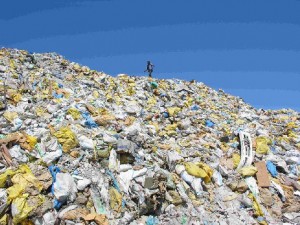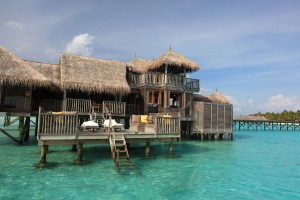A small stretch of azure water is all that separates the luxury island resorts of the Maldives and a ticking toxic time-bomb: Thilafushi Trash Island. Private Island News investigates.
Planning that once-in-a-life time private island escape? The chances are that the Maldives won’t be far from the top of your travel wish-list. Conjuring up images of whiter-than-white beaches, brilliant blue skies and crystalline waters, the much loved Indian Ocean escape has become synonymous with glitz, glamour and gorgeous scenery.
Yet a considerable blot on the horizon can be found just 30 minutes away from the luxurious resort islands – a smouldering hell situated smack bang in the middle of paradise. Since the garbage predicament of the early 1990s, Thilafushi Island – built on re-claimed coral reefs – has formed a dumping ground for the republic’s relentless stream of rubbish – taking in an estimated 330 tonnes of trash every day.
Of these 330 tonnes of waste, only a fraction is separated and recycled. Plastic bottles, engine oil, paper and metal are collected and shipped off to recycling plants in India, whereas the rest of the rubbish – including hazardous batteries and electronic devices – are set on fire or left to rot.
As Ali Rilwan of environmental group Bluepeace Maldives explains, the damaging chemicals contained within these items inevitably spread out into the ocean. “The batteries contain lead. There are products with mercury in them. All of these can easily get into the food chain. Unlike landfill, this is the ocean they are filling.” The rate of ocean pollution shows no sign of slowing down, either.
Since its opening in 1992, Thilafushi has grown at an extraordinary rate – expanding at the same extraordinary pace as the country’s tourism industry. Considering that official statistics suggest that tourists are responsible for producing 3.5 kg of waste per person per day (compared to 1.2 kg by native residents) it is therefore unsurprising that the mountains of waste now count as the highest point in the low-lying island republic.
The threat to the long-term future of the holiday paradise means that the tourism industry can’t afford to turn a blind eye to the problem, however.Indeed, despite being located just a matter of miles away from the infamous island of detritus, many of the private island resorts of the Maldives might as well be on another planet when it comes to establishing sound environmental policies.
Bolstered by private funding and free from the political problems that plague the state-controlled dump at Thilafushi, many of the resorts have been free to establish an array of effective and environmentally friendly waste management programs which encompass everything from composting of bio-waste, creating home-grown produce and an increasing reliance on renewable energy sources.
Gili Lankanfushi is just one of many Maldives islands resorts to put a particularly innovative attitude to the environment into practice. Even during the design phase, the idyllic island rental – located in the Malé Atoll – was carefully planned to minimize any negative impact on the environment. The chic island cottages were constructed using almost exclusively sustainable materials and all members of staff have been trained to be as economical as possible with resources and materials used on the island.
The environmental responsibility runs right through to the island’s waste management system. As a member of the Gili Lankanfushi team explained to Private Island News, the resort’s policy regarding waste management is based on the motto “reduce, reuse and recycle.” Waste is collected in colour-coded bins, with organic waste later used for composting in the island’s two gardens.
There is clearly much left to be done in order to ensure a truly long-term, sustainable future for the Maldives, but as the country’s private island resorts are proving – the likes of the Thilafushi trash island is not necessarily the price one has to pay for paradise.
Have your say: Is the tourism industry doing enough to promote and maintain a sustainable environmental attitude within the Maldives? You can share your news and views on our social media channels. You’ll find us on Facebook, Twitter and Google+




